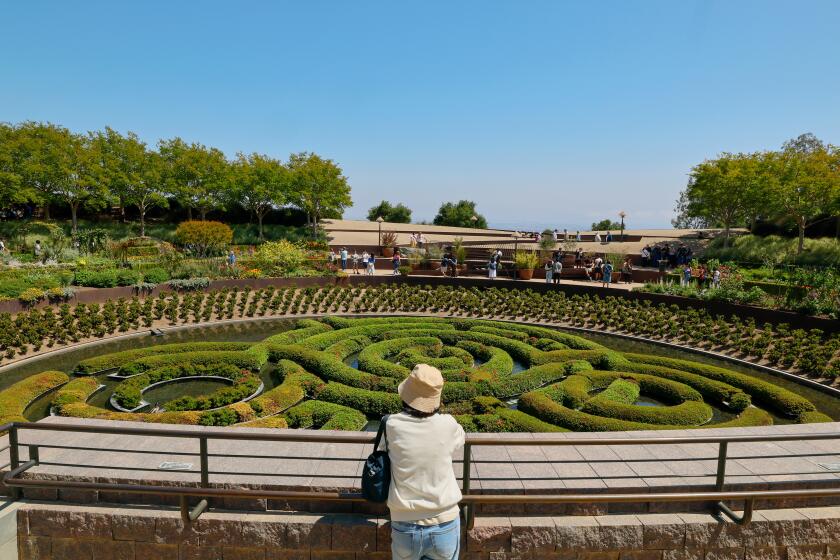Symbolic Lion Brings Good Fortune to Festival : Little Tokyo Drums In the New Year
The wispy, almost melancholy notes of a Japanese bamboo flute hung in the air while drummers stood ready.
Then with shouts and a boom, the musicians’ arms slashed downward and the Japanese Village Plaza in Little Tokyo shook with the beat of taiko drums in a festival welcoming the new year.
The fragile beauty of the flute merged with the pounding strength of the drums, as members of the Los Angeles Matsuri Taiko troupe beat out a seasonal message of joy.
A masked clown wandered by, soon to be chased by a red-faced, black-eyed, golden-toothed lion, robed in green with a flowing blond mane.
Not a Cowardly Lion
The lion swooped, swirled and turned. He threatened to bite the heads of two toddlers. He gnawed on a drum. He nibbled his legs and feet like a giant house cat afflicted with fleas. He stalked, tormented, and bit a musician’s cloth headband that had fallen. Sleepy or exhausted, the lion lay down, rising only to chase the clown again.
It all became just a little too much for 3-year-old Naomi Kang, who cried out in fright from atop her father’s shoulders. Chong Won Kang gently assured his daughter there was nothing to fear.
“People living here miss a lot of stuff from the New Year’s celebration,” said Kang, a naturalized American from Japan. “So we come here to remember what we used to do in Japan. . . . It’s nice, and I want my daughter to see.”
Japanese New Year is celebrated according to the Western calendar but with ancient customs that give an important role to lion dances during the first days of the year.
Good-Luck Bite
“If the shishi (lion) ‘bites’ the children’s heads, it makes them smart,” explained Etsuo Hongo, troupe leader and the man inside the lion. “Not only smart, but healthy.”
The lion’s main task is to ensure good luck to those it visits.
“In Japan, they go to all the stores, and it drives away the evil spirits,” said drummer Kyoko Hongo, the leader’s wife. “It’s supposed to bring good fortune for the New Year.”
The lion saved visiting the plaza’s shops for today, when the taiko and lion performances are due to be repeated at 1 p.m., followed by good-luck dancing inside the various stores at about 4 p.m.
In Japan, the lion dancers “come on their own” to shops, whose owners then “give a little ‘ o-rei ,’ or ‘thank you,’ ” in cash to the performers, said Vic Kambe, the plaza’s management director.
The plaza merchants’ association contributes money for the Little Tokyo performances, Kambe said, but most store owners also give token amounts directly to the troupe.
“I guess it’s bad luck if they don’t,” he explained.
More to Read
The biggest entertainment stories
Get our big stories about Hollywood, film, television, music, arts, culture and more right in your inbox as soon as they publish.
You may occasionally receive promotional content from the Los Angeles Times.






